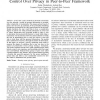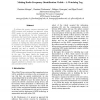62 search results - page 2 / 13 » Privacy for RFID through trusted computing |
UCS
2004
Springer
13 years 10 months ago
2004
Springer
Today’s RFID protocols that govern the communication between RFID readers and tags are solely optimized for performance, but fail to address consumer privacy concerns by support...
SACRYPT
2005
Springer
13 years 10 months ago
2005
Springer
The ability to link two different sightings of the same Radio Frequency Identification (RFID) tag enables invasions of privacy. The problem is aggravated when an item, and the ta...
ACSAC
2002
IEEE
13 years 9 months ago
2002
IEEE
The Solar Trust Model provides a method by which the sender of a message can be authenticated, and the level of trust that can be placed in the sender of the message or the messag...
JCP
2007
13 years 4 months ago
2007
— Every time a user conducts an electronic transaction over the Internet a wealth of personal information is revealed, either voluntarily or involuntarily. This causes serious br...
PERCOM
2007
ACM
14 years 4 months ago
2007
ACM
To address the privacy concerns associated with RFID, previous work proposed an approach, where RFID readers do not only broadcast commands to inventory tag populations, but also ...


